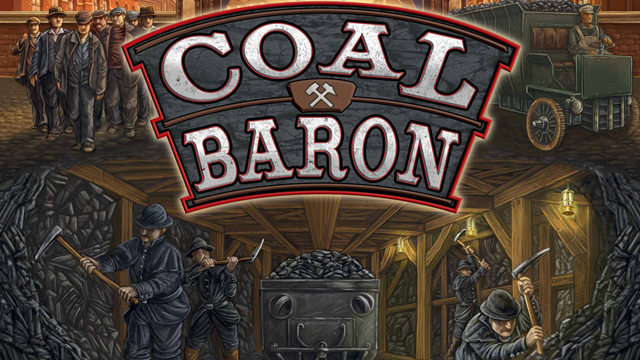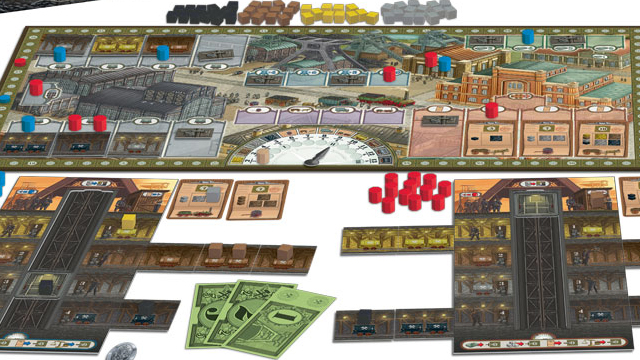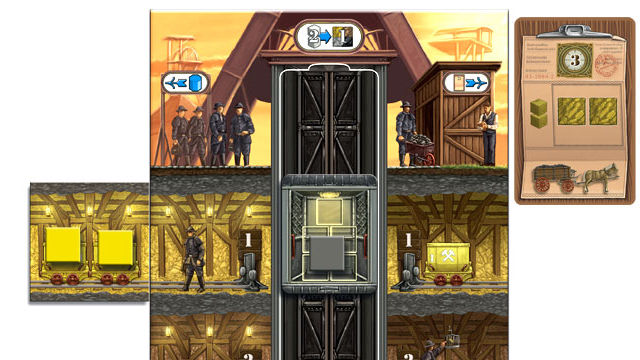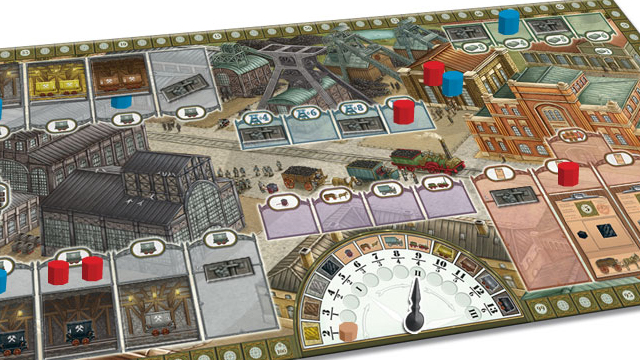
There are a lot of worker-placement games on the shelves these days. Each one brings its own special spin on the core mechanic, but for the most part, every action taken by one player results in one fewer choice for those who follow. Competition for desired actions and a limited number of workers each round forces players to prioritize, and a backup plan or three never hurts.
Coal Baron, a 2013 design by Wolfgang Kramer and Michael Kelsing, takes a different approach. Instead of only a handful of workers, each player has over a dozen, with the specific amount depending on the actual number of players (up to four). If a player wants to use an action previously taken by another player — or even themselves — all they have to do is assign one additional worker to that action. This adds a new level of strategy, as you must balance the actions you want to take against how many workers you are willing to spend to take them.
Actions come in five different types. The most basic is banking, which earns you money. Worth noting is that you can always get a flat one dollar per worker if you have nowhere else to assign them. Larger payouts require actual actions, although after a certain point the per-worker amount becomes prohibitive.

Once you have cash, you can use it to expand your coal mine with a tunneling action. Each mine has four layers of coal available to it; the better the quality, the more it costs to excavate. Tiles feature either one or two mine cars, each of which holds one cube of corresponding quality of coal. Additionally, mines are divided into unlit and lit sections that must be balanced by the end of the game or points are penalized. When a mine tile is purchased, a new one immediately replaces it to keep the action space available. There is also a space that allows players to look at the top five undrawn tiles, choose one, and place the rest either on the top or bottom of the stack.
Similarly, order actions let you acquire contracts to sell your coal. Each contract specifies a specific type or mix of coal as well as the method of transportation. As with tunneling, new orders replace taken ones immediately and the same “top five” option also exists. At the game’s end, any unfilled orders will be penalized to don’t get too ambitious.
So you have the coal and you have the contract, but how do you get one to the other? This will require an actual mining action. Each space in this area represents how many moves you can make with that action. Each move can be spent to either move your elevator to any one level of your mine or to move one cube of coal to or from your elevator. Your elevator can only carry five cubes of coal at any time, so plan your orders carefully to maximize efficiency. If you need to unload coal but have no appropriate contract, you can place it in your storage shed but it will still cost an additional move to get it from the shed to a contract later.

Finally, once an order has the coal needed to fill it, the corresponding transport action must be taken to score it. Conveniently, if you have multiple orders that all require the same transportation method you can ship them all with the same action. Once again: efficiency is the order of the day.
The shift (round) ends when everyone has placed all of their workers. At this point there is a bonus scoring phase. After the first shift, the bonuses are simply for the most coal of each type successfully delivered. The second shift awards those bonuses and also adds rewards for most coal shipped via each transportation method. Finally, the third shift asks how many empty mine cars players have in their mines on top of the previous two shifts’ bonuses. Completing orders early can really pay off, but be aware that the bonuses are only paid to the first- and second-place players (assuming more than two players) so pay attention to your opponents’ orders!
Coal Baron plays fairly quickly, usually in under 90 minutes as long as players don’t agonize over their actions too much. Thanks to being able to take any action you want as long as you have enough workers, you can usually execute your desired plan without too much interference. That being said, “taxing” opponents into paying more workers for a clutch action is not unheard of, especially as the shift winds down and workers become scarce.

If there is a problem to Coal Baron, it is probably the random mine tiles. Sometimes what you need just doesn’t come up on any of the eight spaces or the top five of the stack and that can really set you back. The random order cards are less of an issue because your orders usually dictate what mines you need, not the other way around, although it is possible to play that way too. The random tiles are necessary for the light/dark balance penalty as well as to make the action spaces more competitive, but it is still a potentially frustrating flaw in an otherwise solid design.
Coal Baron retails for $45.



















